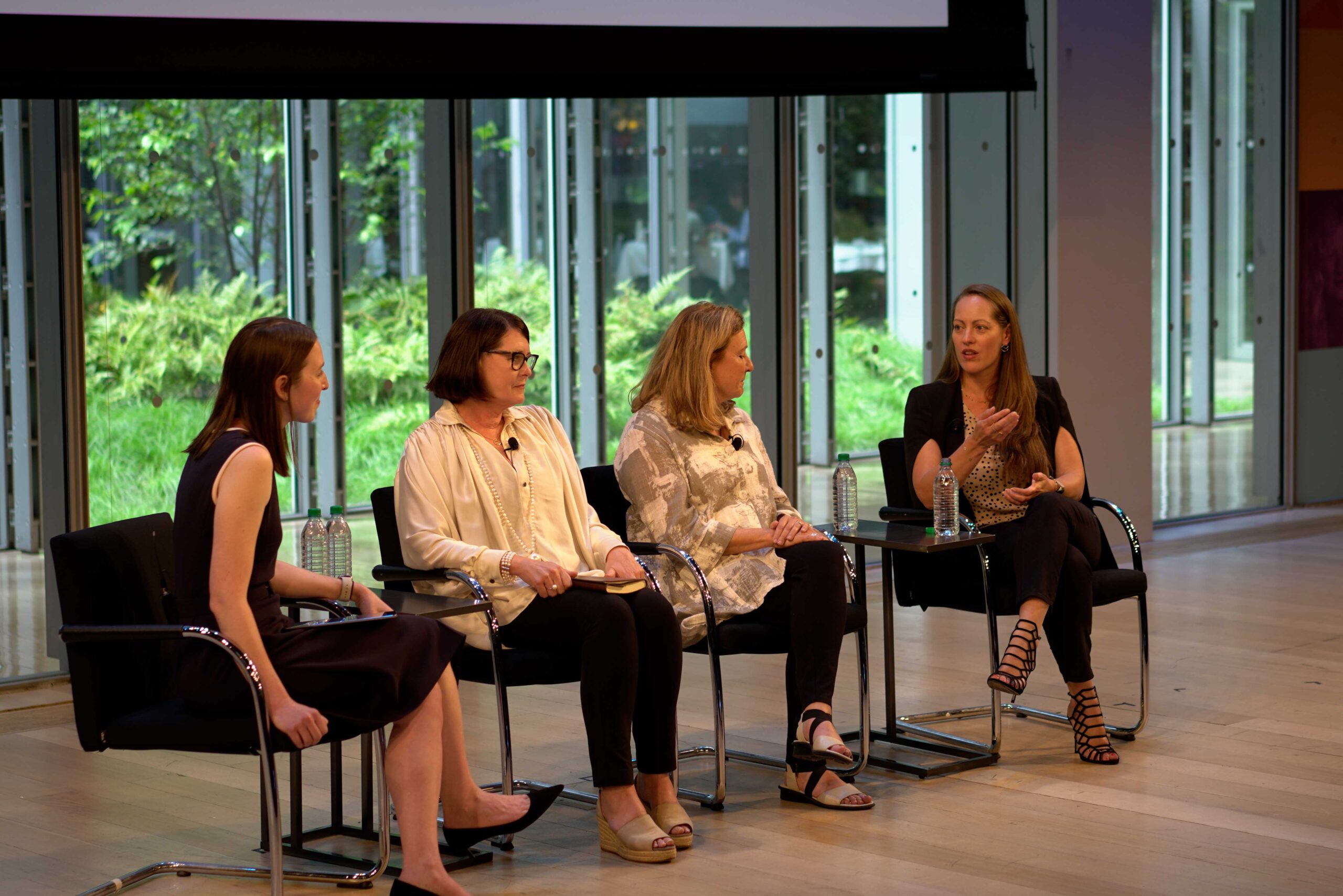Recapping Insight’s Women’s Tech Leadership Summit

Innovation. Disruption. Change. In an age of unprecedented business and societal shifts, tech companies are redefining the way we work and live. Insight Partners invests in, and partners with, companies leading this change. Our companies want to be more diverse, inclusive workplaces offering equal opportunity for all.
This was the inspiration for Insight Partners’ inaugural Women’s Tech Leadership Summit. The summit was a celebration of how far women have come in the tech industry, and an exploration of what all of us can do to be the “faces of change”. We were truly inspired by the capable and driven leaders who joined us from around the world.
We have summarized some of the inspiring presentations from the conference below.
The Case for Action: Prioritizing Equity and Inclusion
Megan Smith delivered the keynote presentation, "The Case for Action: Prioritizing Equity and Inclusion". Megan spent time at Google, leading new business development, before becoming the 3rd Chief Technology Officer for the US under President Obama. She is currently the CEO at Shift7, where the core mission is solution creation through inclusion.
Megan has spent her career tackling diversity and, more importantly, inclusion, and shared a number of anecdotes, and learnings that touched on several key themes:
1. The importance of collective genius
First and foremost, we as leaders need to be engaging our broader communities to broaden the participation in technology and innovation. A great example is Grace Hopper, who developed the compiler. She believed that a programming language based on English was possible and her compiler converted English terms into machine code understood by computers. This opened up programming to more people.
2. We are training our collective "AI" on an incomplete dataset
When we think about what we see in textbooks, films, our day-to-day meetings, we don’t see or capture the full picture.
- About 2/3 of the code breakers at Bletchley in WWII were women, a fact less apparent in the Hollywood film, The Imitation Game. More broadly, comparing the speaking times of men vs. women in Disney movies reveals a stark disparity upon which much of today's AI/ML is based. Women are not given as much speaking time, or not shown to be leaders in our cultural icons. This is not a true representation.
- Joy Buolamwini, a researcher at MIT noticed that facial recognition software could not recognize people of color, spurring market leaders in AI like Microsoft and IBM to address these glitches head-on.
3. Innovation is already happening everywhere - we need to tap into it
Pockets of communities and organizations have made real strides in diversity and inclusion and we as organizations should look to them as an example. For instance:
- There are thousands of tech Meetups happening around the country outside of known tech hubs. People are organizing in places like Boise, Milwaukee, and Flagstaff.
- The concept of Chief Science Officers is expanding, and is are a result of a STEM intervention program for high schoolers and middle schoolers, empowering young people to be at the forefront of science and technology innovation.
- Every high schooler graduating from Chicago Public Schools will have a computer science class requirement, starting with the class of 2020. CSNYC is a program that has the same goal for schools in New York City.
4. We must make diversity and inclusion a daily priority and topic of discussion
Change is not made in summits and conferences held once per year, though they are a great starting point - impact happens through regular discourse, whether in quarterly roundtables, weekly internal discussions, or daily awareness and feedback from our everyday interactions. We need to keep the topic front and center by addressing it regularly and ensuring that our actions reflect it as a priority.
Leading the Way: Discussion with Tech Suite Trailblazers
Only 6% of Fortune 500 CEOs are women. Within VC-backed companies, 11% of overall C-suite roles are filled by women. We have work to do.
For our "Lead the Way" panel discussion, we invited three accomplished C-suite leaders from Insight portfolio companies to share their stories on career path, advice for the next generation of leaders, and ideas on how to drive diversity and inclusion within tech companies. These women are running software companies tackling hard problems in education, payments and retail, using innovative technology and machine learning. We left feeling inspired by the courage, ambition and leadership of Martina King (CEO, Featurespace), Christine Willig (CEO, Illuminate Education), and Linnea Geiss (COO, PDI Software).
The panelists shared stories about pivotal moments in their careers. Each described a very different path to the C-suite, with a common thread: At every fork in the road, they embraced challenges and took the leap. Martina’s career has included a leadership role at Yahoo! Europe during the dot-com bust, as well as running media and augmented reality companies. She spoke about the importance of perseverance, a focus on customer value, and owning the revenue line. Christine has built deep experience in education as she made strategic moves from product to sales and marketing, between large companies and “keeping the lights on” in start-ups, and as a CEO and senior executive. Linnea has spent time in product management and corporate development, and venture capital and has never shied away from stepping up to a new role. Taking personal risk is a theme across these successful careers.
The group further discussed action items to drive tech company diversity and foster more female leaders – with a focus on culture and personal development. Christine Willig shared that she tells her direct reports, “my goal is help you build a path to your next leadership position.” Linnea echoed that “leadership isn’t about me, it is about everyone else”, and noted that it is critical to make the company an attractive place for working parents (both men and women). There was consensus that attracting multiple female leaders on the executive team (as is the case at PDI and Illuminate) can help with recruiting more female executives, and women at all levels of the organization. Martina King remarked “if we as female leaders can show how much success we can achieve that will only help push more women into executive and CEO roles.”
Insight is optimistic about the road ahead for more women to become senior business leaders in tech companies. The three panelists demonstrate that through taking personal risks and fostering inclusive teams, leaders can be the faces of change, even as they drive the change.
In Her Shoes: One Path of Disruption
We had the pleasure of hearing Bonita Coleman Stewart discuss her career and lessons learned with Managing Director, Anika Agarwal. Bonita brings more than 20 years of marketing, technology, and industry expertise to Google, where she oversees the company’s Partner Business Solutions for North and South America. Bonita is also on the Board of Directors at two public companies: Pluralsight (an Insight portfolio company) and Deckers Brands. Bonita’s advice left us feeling inspired about the path ahead. She mentioned that oftentimes, we are focused on a linear career path and the expected next step from one level to the next. Bonita has spent her career zigzagging between the corporate world, entrepreneurship, and various roles and industries. Her career has been non-linear. She emphasized how important it is to zigzag and take risks in order to ensure you gain critical new skills. Broader, rather than specialist skills will be required as you take on more senior roles or think about joining a Board of Directors. Zigzagging builds integrative thinking, broad problem solving and pattern recognition.
On the topic of boards, Insight believes that workplace gender equity begins in the boardroom – driving progress in critical areas like pay equality, workplace culture and diversity/ inclusion policies. The tone for equal opportunity and inclusion is set at the top of the corporation. Bonita believes that it’s important to gain P&L responsibility (be close to the how your company makes money), and demonstrate an overarching understanding of business if you aspire to a senior executive position, or a board seat. Bonita’s parting admonition was inspiring: Measure success by looking around the room and saying, “is everyone here?” If there are people who represent other communities, religions, ethnicities, or minorities, we have an obligation to change that.











